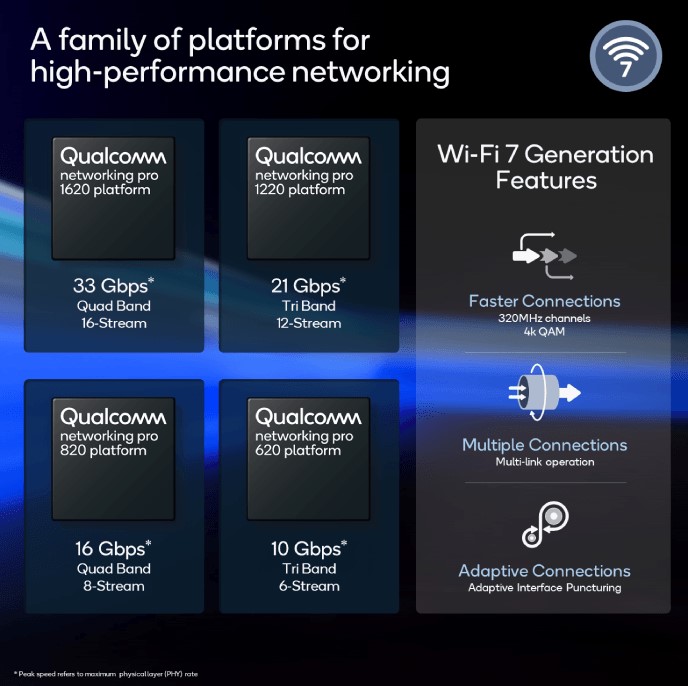It's looking increasingly likely that Wi-Fi 7 will be an option next year. This week, Qualcomm joined the list of chipmakers detailing Wi-Fi 7 products they expect to be available to homes and businesses soon.
The Wi-Fi Alliance, which makes Wi-Fi standards and includes Qualcomm as a member, has said that Wi-Fi 7 will offer a max throughput of "at least 30Gbps," and on Wednesday, Qualcomm said its Network Pro Series Gen 3 platform will support "up to 33Gbps." These are theoretical speeds that you likely won't reach in your home, and you'll need a premium broadband connection and Wi-Fi 7 devices, which don't exist yet. Still, the speeds represent an impressive jump from Wi-Fi 6 and 6E's 9.6Gbps.
The next-gen tech is aimed at network-intensive applications, like virtual and augmented reality, video streaming at 4K and higher, and cloud computing and gaming. By making changes to the physical (PHY) layer and medium access control (MAC), Wi-Fi 7 should allow you to enjoy these applications with less latency and jitter.
Like Wi-Fi 6E, Wi-Fi 7 should be able to leverage the 6 GHz band while expanding channel width support from 160 MHz to up to 320 MHz.

Other expected benefits of Wi-Fi 7 include multi-link operation, enabling the simultaneous use of multiple frequency bands. Qualcomm also pointed to 10Gbps enterprise access points and up to 500 users per channel.
Qualcomm announced two tri-band and two quad-band offerings for home and business use, and the company expects Wi-Fi 7 to hit homes as soon as next year, Digital Trends reported. Qualcomm's Network Pro 1620 quad-band option, which can be used in home mesh routers, claims speeds of up to 33.1Gbps.
Even though the Wi-Fi Alliance hasn't finished the standard yet, Wi-Fi chipset makers MediaTek and Broadcom have also flagged 2023 as Wi-Fi 7's expected debut date and are showing off Wi-Fi 7 technologies. Vijay Nagarajan, Broadcom's VP of marketing for the Wireless Communications and Connectivity Division, said that home availability should come in the second half of 2023.
"Ultimately, Broadcom's Wi-Fi 7 will keep performance a step ahead of the broadband speeds that DOCSIS 4.0 and multi-gigabit PON technologies bring to the home," Nagarajan told Ars Technica.



3175x175(CURRENT).thumb.jpg.b05acc060982b36f5891ba728e6d953c.jpg)

Recommended Comments
There are no comments to display.
Join the conversation
You can post now and register later. If you have an account, sign in now to post with your account.
Note: Your post will require moderator approval before it will be visible.